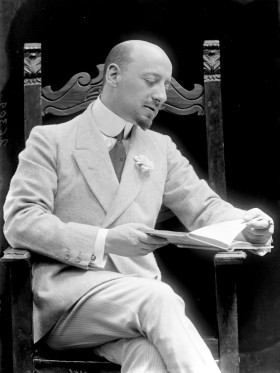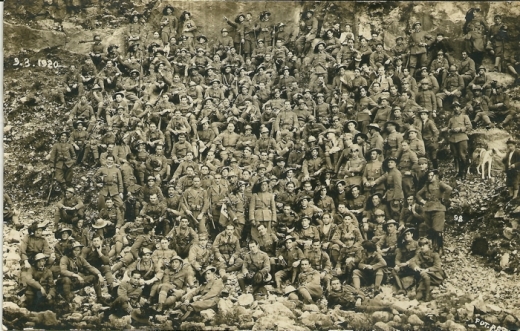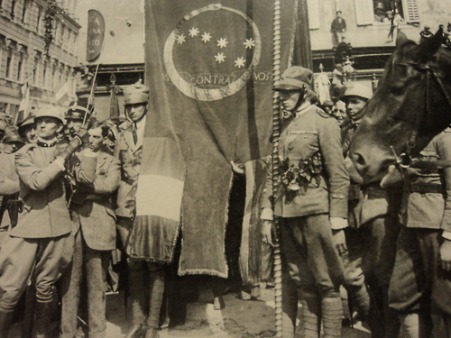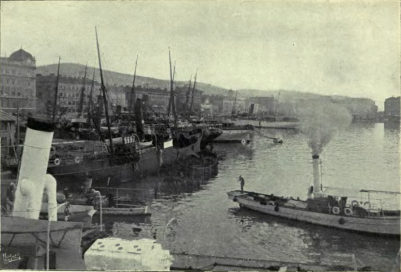During the golden age of piracy in the 17th and 18th century, heroic rebels plundered the lucrative shipping routes between Europe and the New World. They operated from free ports, the so-called pirate utopia’s on islands and along unreachable coastlines, outside the grasp of civilization. From these anarchist enclaves these free men organized unseen raids with which they undermined mercantilism and the upcoming system of worldwide oppression, slavery and colonialism.
One of the last of these pirate utopias was founded in 1919 by the celebrated poet and well known Italian national hero Gabriele D’Annunzio (1863-1938). He gained fame during the First World War, where he fought in the Italian army, but refused, as did so many of his generation, to conform himself back to civilian life after the war. Therefore Italy became a pool of nationalist and revolutionary aspirations after the war. Futurists, fascists, anarchists: all tried to create a ‘new’ Italy, based on heroism, national glory and overcoming the class struggle.

Fiume (now known as the Croatian Rijeka) was part of the Habsburg Empire for centuries, before the First World War made an end to this. And although the city was then claimed by the Italians, it was given to the Slaves in Versailles by the Entente. D’Annunzio did not agree with this and moved from words to actions by marching from Ronchi di Monfalcone to Fiume in September 1919 with about three thousand deserted Italian soldiers. The city was conquered without even firing one shot and D’Annunzio and his troops were warmly welcomed by the population of the city.

After the Italian government refused to annexate the city, Gabriele D’Annunzio pronounced Fiume to be a Free State and for sixteen months conducted a revolutionary reign. With this Fiume became a social experiment and pilgrimage for all kind of freethinkers, artists and revolutionaries. Together with the national-syndicalist Alceste De Ambris he created the ‘Carta del Carnaro’, which served as the new constitution of the newly formed Free state. The absolute equality of men and women, freedom of religion and a comprehensive social system based on corporatism were the essential principles of this new constitution. Gabriele D’Annunzio wanted to develop a new civilization that was different from the corrupted, shiftless, vulgar and outplayed politicians of western civilization. His free port had to set the example to create a new spiritual storm which would radically change the western world. This new civilization would no longer be based on mammon and power, but on heroism and individual freedom.
D’Annunzio thought it was of a crucial importance that the population of Fiume introduced a new way of living. Each day parades were held, bonfires were ignited and theatrical speeches were given to inspire the population. A participation-democracy was realized with a decentralized government and many forms of direct democracy. This social experiment became the starting point of departure for universal rebellion. And under the leadership of the futurists, revolutionaries and other adventurers that en masse came to the city, it seemed this could work. After a trade-blockade by Italy to undermine the economy of Fiume, D’Annunzio developed an alternative system which was mainly based on piracy. His land- and sea robbers he called ‘Uscocchi’, after the infamous Slavic pirates from the past, who raided the region. One of the most well-known actions of the Uscocchi took place on the 18th of April 1920, when they robbed 46 expensive thoroughbreds from a riding school of the Italian army. The Italian government was furious and threatened with hard sanctions against Fiume, after which D’Annunzio promised to return the horses. However instead of returning the stolen thoroughbreds, D’Annunzio returned 46 emaciated peasant horses to the Italian government. A provocation which inspired many people.

Gabriele D’Annunzio was ahead of his time when he noticed the newly formed League of Nations (the predecessor of the United Nations) was a conspiracy of thieves and scammers. As an alternative he founded the ‘Lega di Fiume’, a league which had to unify and liberate all the oppressed peoples of the world. Within this league there would be place for the Irish, the Palestinians and other Arab peoples, Asians and of course the Slavic peoples who were oppressed by Serbia. However, these plans came to an abrupt end when in the December month of 1920 the Italian army made a definitive end to D’Annunzio’s pirate utopia, This day became known as ‘Bloody Christmas’.
After the fall of the Free state Fiume, Gabriele D’Annunzio retreated to Italy, where many of his ideas found an entrance in the rising fascism of Mussolini. Although he supported some fascist ideals, he strongly rejected others. The poet supported the corporatist arrangement of the economy and the strife for a new society based on heroism, action and nationalism. However Mussolini’s alliance with the foundations of the ‘old’ Italy – the monarchy and the church – could of course not get his approval. The Free state of Fiume was by no means an example what Italy could expect for the coming two decades. The Free state of Fiume was a social experiment in which the anarchist principles of direct democracy stood at the basis, while the fascism of Mussolini degenerated into a conservative and totalitarian dictatorship. Where the population of Fiume knew an unprecedented individual freedom, many Italians totally forgot the meaning of freedom after twenty years of fascist oppression.
Every attempt to qualify D’Annunzio’s regime as a rightwing or leftwing phenomenon is deemed to fail. The great force of the poet was his ability of acquiring support from a colorful and very diverse companionship that was capable – be it for a short period of time – to create their own reality. With the fall of the Free state of Fiume there came an abrupt end to the glory time of the pirate utopias. In a time in which the influence of modern society seems to be insurmountable and the State seems to influence all aspects of human life, the prospect on such a Free state seems further away than ever before. However, it is exactly because of this that we have to keep on pursuing the ideals of D’Annunzio and other spirited rebels. Only by realizing Free spaces outside the influence sphere of the State – how big or small they maybe -, we can show the people that real freedom can still be achieved.


No comments:
Post a Comment